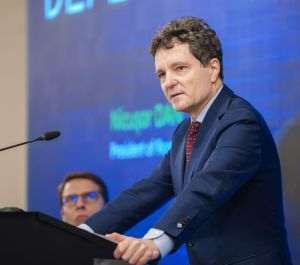The European Central Bank (ECB) decided yesterday to keep its benchmark interest rate unchanged for the fifth consecutive month, but signaled that it could cut the cost of credit soon, even as investors question a similar decision by the Reserve American federal, reports Reuters.
"The Governing Council decided that the three representative interest rates of the ECB remain unchanged. The new information broadly confirmed the Governing Council's previous assessment of the medium-term inflation outlook. Inflation continued to decrease, especially due to the lower dynamics of food and goods prices", reads the press release published at the end of the meeting of the ECB Governing Council, notes Agerpres.
As a result of yesterday's decision, the interest rate for the main refinancing operations and the interest rates on the marginal lending facility and the deposit facility will remain unchanged, at the levels of 4.50%, 4.75% and 4%, respectively.
The ECB left interest rates unchanged from September 2023, but signaled that it could discuss a reduction in the cost of credit, waiting for the publication of some comfortable data on the evolution of wages and inflation before making a decision.
"If the Governing Council's updated assessment of the inflation outlook, the dynamics of core inflation and the robustness of monetary policy transmission would further strengthen its certainty about the sustained convergence of inflation to target, it would be appropriate to reduce the current level of policy tightening monetary", states the euro release.
Several officials from the ECB have been talking for a long time about an interest rate cut at the meeting in June, which in the opinion of the financial markets is practically a prior commitment, and a possible abandonment would harm the credibility of the Frankfurt institution.
• IMF: "Inflation will continue to fall, but it is not yet defeated"
Inflation is slowing faster than expected, but not yet defeated, International Monetary Fund (IMF) Managing Director Kristalina Georgieva said yesterday, advising central bank officials to carefully calibrate their interest rate-cutting decisions against statistical data that will come in the next period, according to Reuters.
According to the IMF director, in the last quarter of 2023, core inflation in advanced economies was 2.3%, significantly lower than 9.5% 18 months ago, and this downward trend is expected to continue. in 2024. That would create the conditions for the central banks of the major advanced economies to start reducing interest rates in the second half of this year, even if the pace and the moment when the interest rate reduction will begin will vary, Kristalina Georgieva said at an event organized by the Atlantic Council.
"In this last hundred meters it is twice as important that central banks retain their independence," said Georgieva, who urged central bank officials to resist calls for an anticipated reduction in the cost of credit. "A premature reduction could bring new surprises on the inflation side, which would require new measures to tighten the monetary policy. On the other hand, postponing the moment when the interest rate will be reduced could slow down the economic activity", emphasized Georgieva.
The IMF managing director also said the next World Economic Outlook report, due next week, would show a slightly better picture of the global economy, given robust activity in the US and many emerging economies, but did not provide details on to the new forecasts.
Kristalina Georgieva specified that the resilience of the world economy is helped by the good situation on the labor markets, the strong household consumption as well as the removal of blockages from the supply chains, but nevertheless warned that "there are still many things to be aware of." worried".
"The global context has become more challenging. Geopolitical tensions have increased the risk of fragmentation and, as we have learned in recent years, we operate in a world where we must expect the unexpected", concluded Kristalina Georgieva.
























































